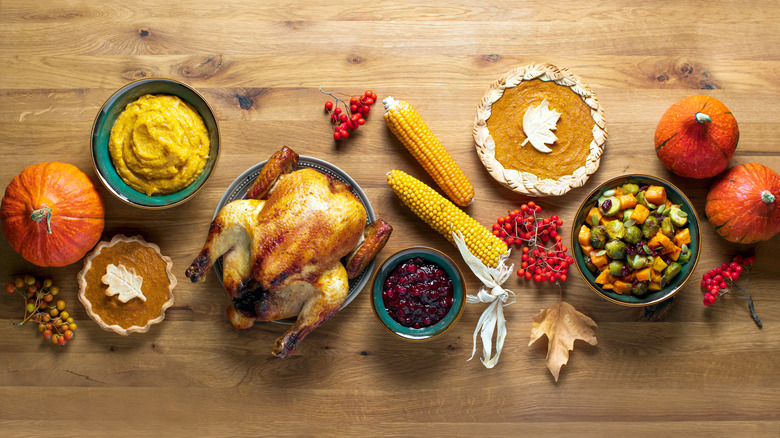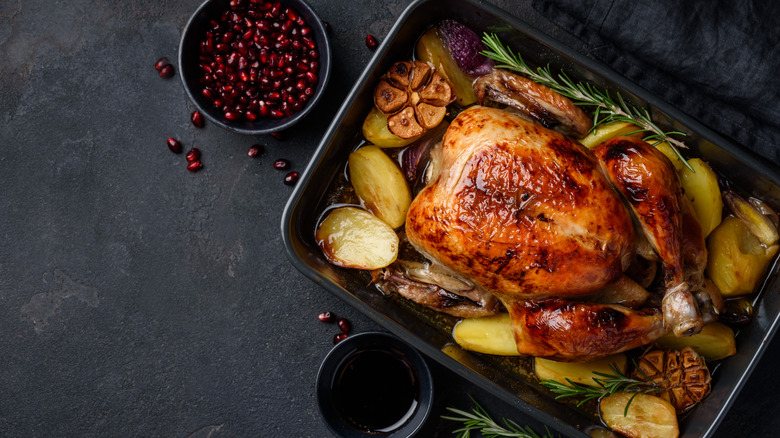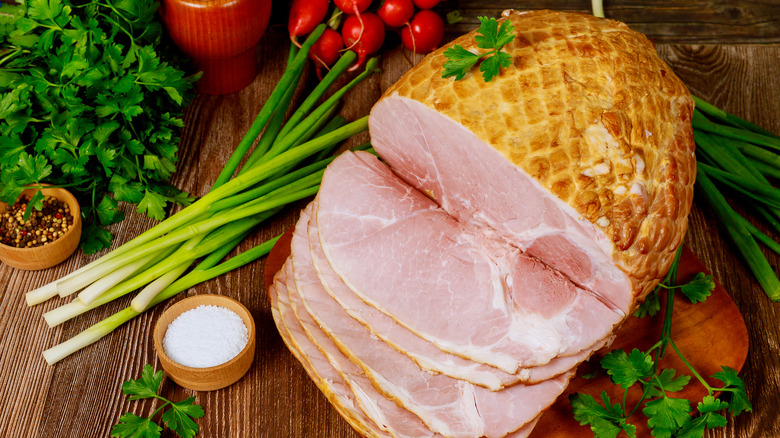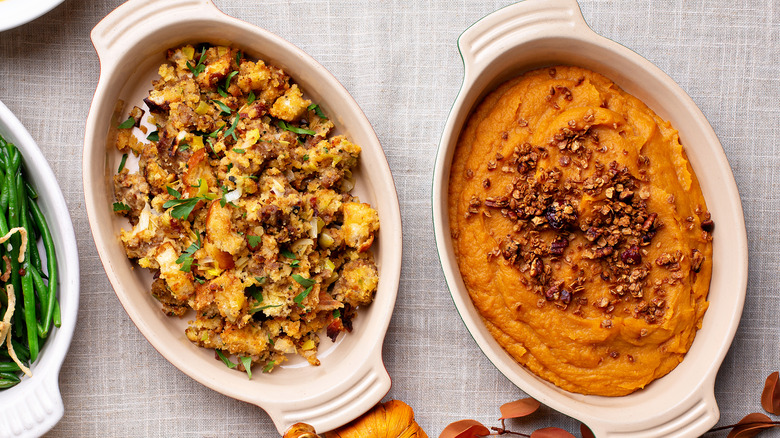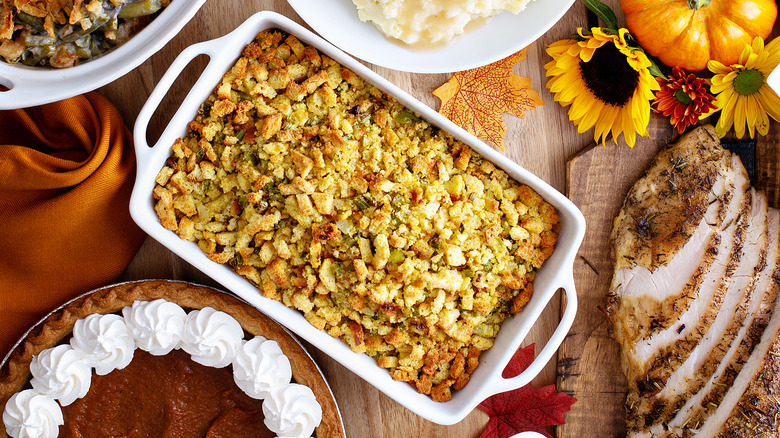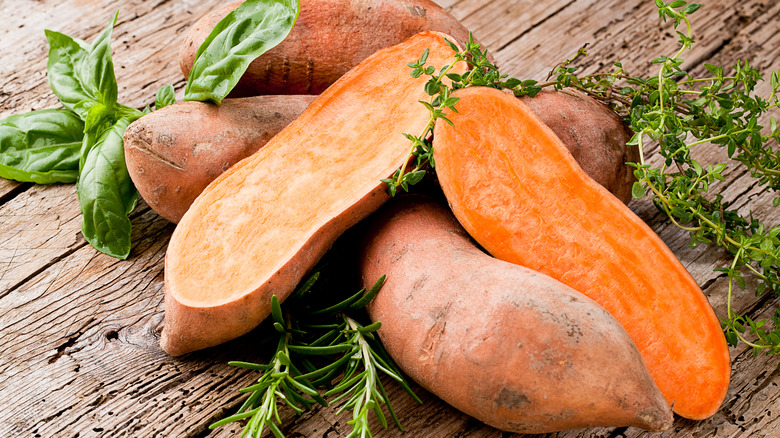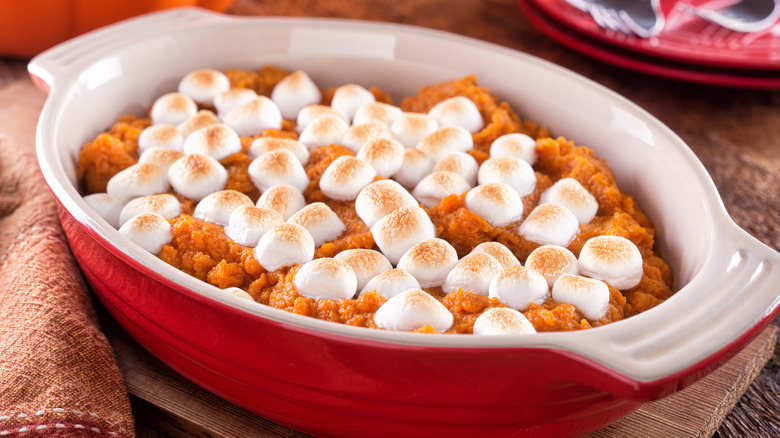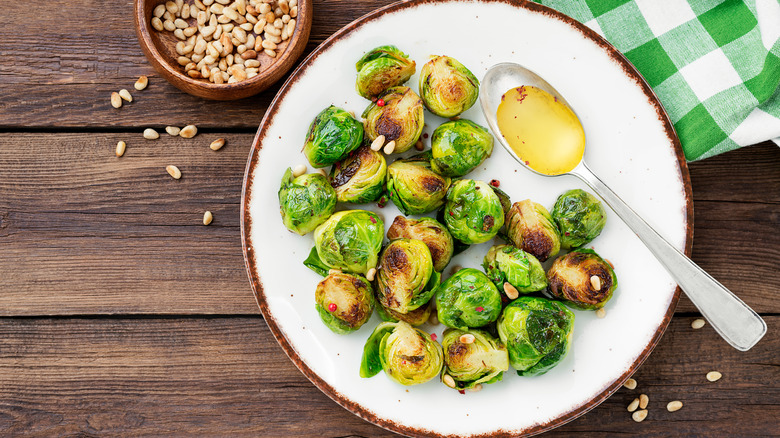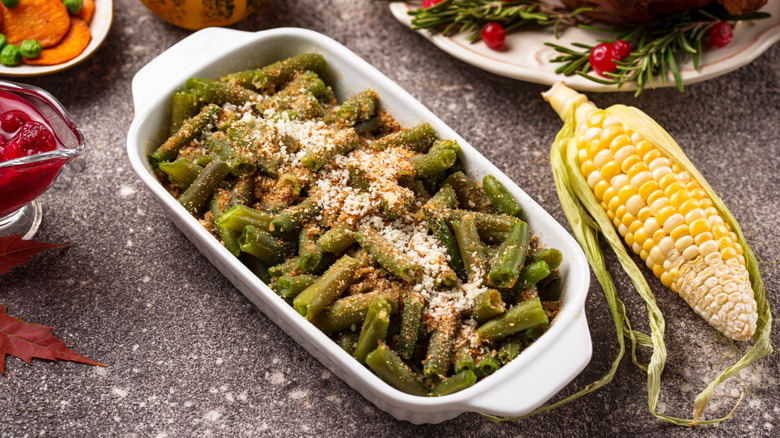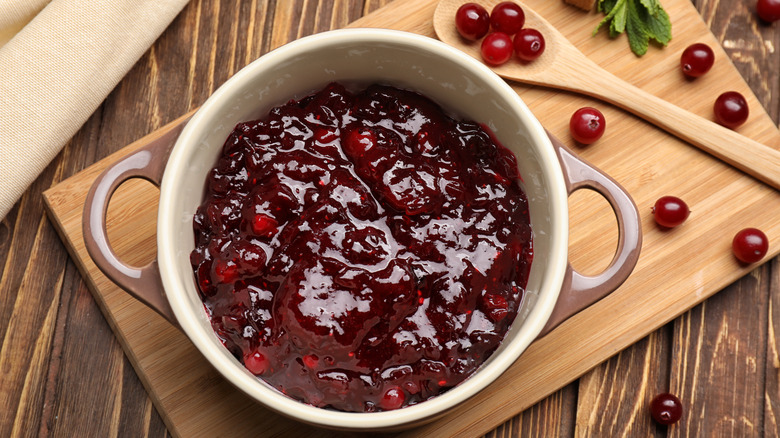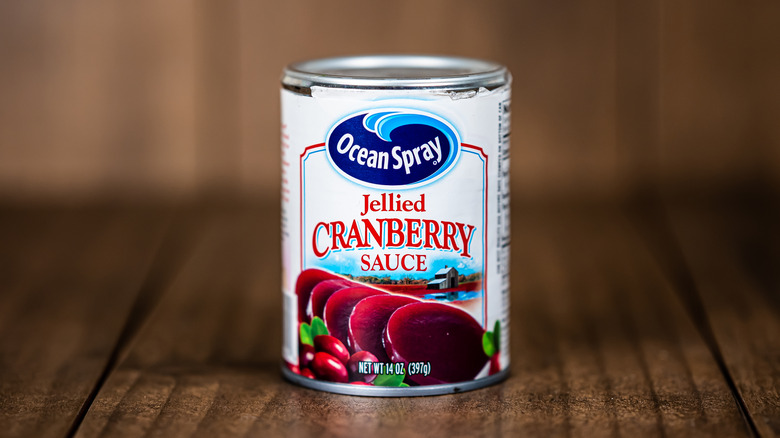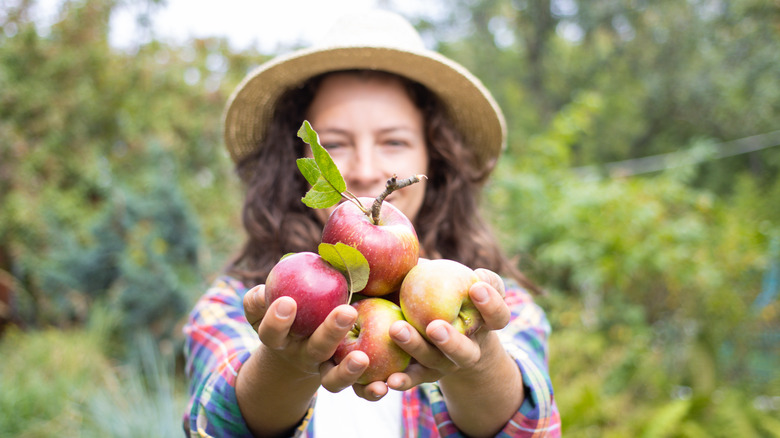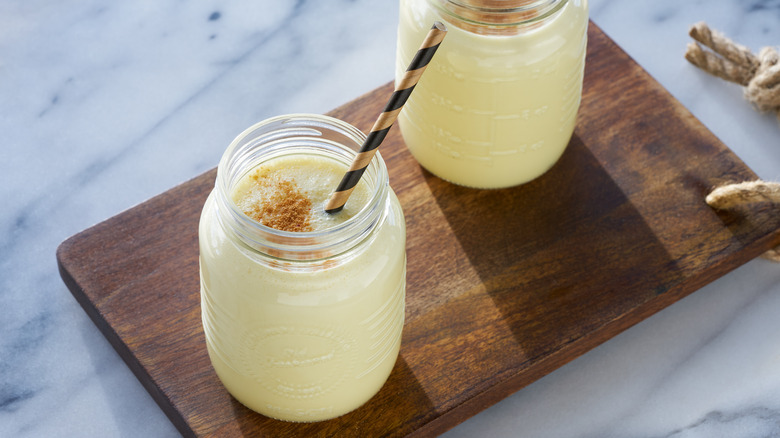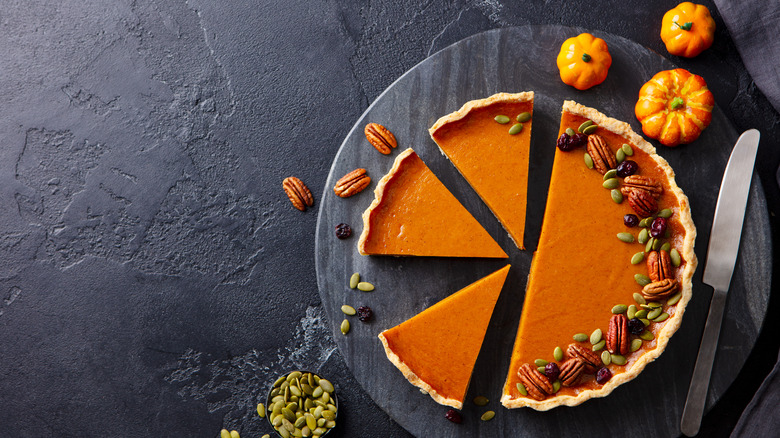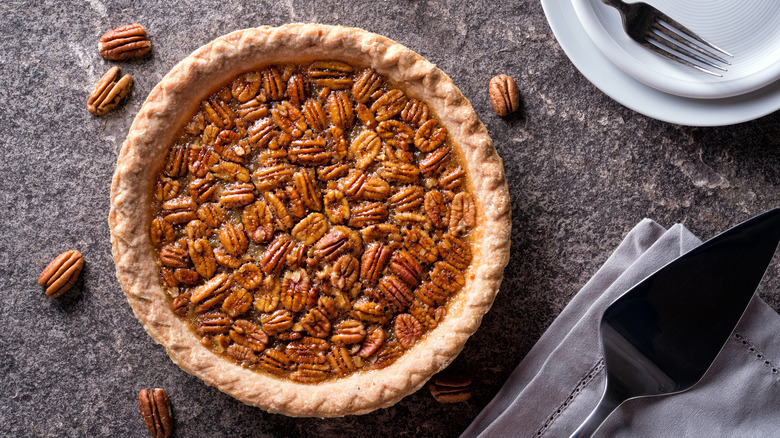7 Foods To Eat On Thanksgiving And 7 To Avoid
While nearly everything that traditionally graces a Thanksgiving tablescape is delicious (except for the Jell-O salad, right?), not all of our favorites are created equal, nutritionally speaking.
Whether you are hoping to enjoy the holidays without derailing this year's fitness progress or just hoping to maintain a semblance of your healthy lifestyle this season, it is useful to determine which Thanksgiving dishes have high nutritional values and which ones can be conveniently bypassed. Of course, if you want to go ham with the, well, ham, that is your prerogative and we respect it.
For those hoping to enjoy Thanksgiving with their families without the standard 0.2% increase in body mass, rest easy. There are many filling and healthy foods to choose from on turkey day. And if all else fails, you can always enter yourself into a Turkey Trot to get some exercise after partaking in all of the delicious morsels (via Healthline).
Eat: Turkey
For years it seems like people have been citing turkey and the tryptophan it contains as the reason we get sleepy after a big Thanksgiving dinner. While there is some truth to the tryptophan tale (it can make you sleepy), turkey does not contain enough to make you tired (via Medical News Today). The amount of tryptophan in turkey is likely the perfect amount to help balance your serotonin levels and promote alertness and a good mood. Moreover, turkey is actually one of the healthiest things you can consume on Thanksgiving because of its protein, vitamin, and mineral content.
Depending on whether you gravitate towards light or dark meat, one serving of turkey can contain nearly 25 grams of protein. This hefty dose can help balance your insulin levels. According to Medical News Today, a standard 3-ounce serving of white turkey meat runs roughly around 135 calories, with around 3 grams of fat and no carbs. The same size serving of dark meat contains 173 calories, with 5 grams of fat and no carbohydrates. While dark meat is slightly higher in calories and fat, it contains B vitamins, choline, zinc, and selenium, all of which have their own wonderful health benefits.
Avoid: Ham
When compared to turkey at a Thanksgiving day dinner showdown, ham ends up being far inferior. Ham typically contains more sodium and preservatives. As Healthline pointed out, a 2-ounce serving of ham contains around 26% of the daily recommended value for sodium. Of course, indulging in a ham-fest once a year won't necessarily elevate your health risk. However, chronically over-eating sodium has been linked to high blood pressure, kidney disorders, and heart disease. Plus, ham is traditionally cured or smoked, resulting in carcinogens.
Processed meats and red meat, in particular, have been linked to inflammation in the body. Inflammation is often at the root of many life-altering health problems, which is why it is important to keep tabs on our consumption. If you want to keep inflammation at bay while enjoying all of the most well-known Thanksgiving day goodies, consider skipping the ham in lieu of some vitamin-containing turkey (via Healthline).
Eat: Homemade stuffing
There aren't many foods that taste better than bread saturated in butter and spices with a bit of gravy splashed on top for good measure. Because stuffing is inherently full of carbohydrates and fat, it definitely isn't the most diet-friendly side to grace the dinner table. In moderation, though, homemade stuffing can be a reasonable choice.
The main draw of homemade stuffing is that you or your home chef (we all have those, right?) have control over the amount of sodium used in the creation of this magical dish. Too much sodium over the long term has been linked to negative health consequences, so it is something to be mindful of (via Verywell Fit).
If you choose to make your own stuffing this year, start with whole grain bread to add an extra kick of fiber. Cornbread stuffing is another great option if you are hoping to regulate your sodium intake. There are tons of great recipes that include apples or other fresh, festive fruit to further up the fiber ante and add precious nutrients to a carb-rich and fat-heavy meal (via Verywell Fit).
Avoid: Boxed stuffing
Boxed stuffing may be easy to prepare, but it pales in comparison to homemade stuffing. And you've probably noticed the Saharan-desert-like thirst it leaves in your mouth. The thing is, boxed stuffing is worth avoiding due to the sheer amount of sodium even a single serving contains. One half-cup serving typically contains upwards of 400 milligrams of sodium before the mix has been prepared. Once you add the necessary butter, pan drippings, and chicken broth, the sodium content can increase exponentially. When combined with all of the other sodium-filled foods offered on Thanksgiving, that amount really adds up.
Even if you were to overlook the sodium content, you'd notice few redeeming qualities in boxed stuffing. Homemade stuffing may contain more fat, but it also can include increased amounts of fiber and protein, which can lead to feelings of satiety after finishing your dinner. It's true that stuffing will never be the "healthiest" side you can reach for on turkey day, but there are ways to ensure it doesn't dismantle the hours of work you have put in at the gym or your typical eating plan (via Verywell Fit).
Eat: Roasted sweet potatoes
Sweet potatoes are exceptional. They can so easily go from being savory to sweet depending on how they are prepared. If your Thanksgiving spread contains roasted sweet potatoes, dig in and eat up because this is one of the healthier options available when it comes to holiday sides. Sweet potatoes are highly nutritious, boasting a large list of vitamins and minerals. This list includes vitamin A, vitamin C, manganese, vitamin B6, pantothenic acid, copper, niacin, and potassium (via Healthline). Not only that, but they have a respectable amount of fiber and very little fat, which sets them leagues apart from the standard T-day fare.
Sweet potatoes are a treasure trove of antioxidants, which are a compound that can help fight inflammation and free radicals within the body. Though this may not be at the forefront of your mind while enjoying your holiday, sweet potatoes can nevertheless help support healthy vision and gut bacteria, and they may even contain anti-cancer properties (via Healthline).
Avoid: Sweet potato casserole
While sweet potatoes in their naked form offer myriad health benefits in addition to being straight-up delicious, the inherent sweetness of sweet potatoes can entice us into creating some of the sweetest, gooiest, and least good-for-you sides in Thanksgiving history. Enter: sweet potato casserole. A traditional sweet potato casserole contains sugar in some form (white, brown, or a type of syrup), butter, and marshmallows — because the pilgrims totally had marshmallows, right?
Marshmallows are made from sugar, corn syrup, and gelatin and don't have much in the way of nutritional value. A standard half-cup serving of sweet potato casserole wields a whopping 26 grams of sugar (via Nutritionix). This amount of sugar may be expected in a holiday dessert; however, in a side dish that is going to be consumed before you even get to the pie of your choosing, well, that is a lot.
Thankfully, sweet potatoes are naturally sweet so they don't really need heaps of sugar. If you want to stick to a healthier style this Thanksgiving, skip over the marshmallow-cloaked, syrup-laden mush and go straight for the roasted version of these delicious orange root vegetables (via Healthline).
Eat: Brussels sprouts
Brussels sprouts are a common fall vegetable that deliver a host of vitamins, minerals, and nutrients with a side of occasional gas, NBD. As is the case with many vegetables, Brussels sprouts are low in calories but high in fiber, which can help you feel fuller (via Healthline).
Roasted Brussels sprouts are a great option to reach for when Thanksgiving dinner is nigh. They contain a bit of protein, vitamin K, vitamin C, vitamin A, folate, and manganese — all of which are essential for overall health. Vitamin K, in particular, is found in abundance in Brussels sprouts and is necessary for keeping your bones stay healthy and for aiding in blood clotting, not that we expect you to break any bones or get any lacerations during your family's pickup football game.
Although you may not want to discuss this at the Thanksgiving table, the high fiber content of these lil cabbage wannabes can help with bowel movements, an essential component of the feeling-good-after-Thanksgiving-dinner pie. Much like the humble sweet potato, Brussels sprouts can provide antioxidants and might even have cancer-fighting properties (via Healthline). Though this may not be your main goal on game day Thanksgiving day, may this information help you opt for healthy foods if you so choose.
Avoid: Green bean casserole
Green bean casserole is yet another Thanksgiving dish that is deceptively unhealthy, despite the Kermit the Frog appearance. Green beans are, obviously, a vegetable, which means that they offer a ton of great nutrients on their own. But once they are transformed into a casserole, they become a fairly unhealthy Thanksgiving day choice.
Most green bean casseroles call for a creamy soup, some soy sauce, and fried onions, all of which load the once-healthy vegetable pile up with fat and a ton of sodium. While sodium is not always the enemy, you should avoid having too much of it. And, unfortunately for green bean casserole fans, this dish contains about 574 milligrams of sodium per serving, which is a brawny bit to consume on top of all of the other sodium-rich dishes (via Healthline).
Don't let the greenery fool you. If you want or need to stick to a lower-sodium or fat diet, bypass the green bean casserole and reach for any kind of roasted vegetable instead (via Healthline).
Eat: Homemade cranberry sauce
As with all homemade dishes, cranberry sauce recipes are subjective and can run the gamut from being low in sugar to being one step away from vaguely red corn syrup. However, homemade cranberry sauces can be a healthy option (via HuffPost). As WebMD put it, "It wouldn't be Thanksgiving without cranberry sauce on the table."
A simple, homemade cranberry sauce is made from fresh cranberries, water, and sugar. Alternatively, you can use agave syrup to add a little sweetness to the dish (via WebMD). Cranberries are high in vitamin C, vitamin E, vitamin K1, copper, and manganese, according to Healthline. They are rich in antioxidants, which can help combat cancer-causing free radicals. They're also "a rich source of various bioactive plant compounds. Some of these, such as A-type proanthocyanidins, may help prevent UTIs," confirmed the publication. Again, these benefits are not always the main goal while enjoying a beautifully prepared holiday meal, but maybe this information will encourage you to make a fresh, minimally sweetened sauce this Thanksgiving.
Avoid: Canned cranberry sauce
A serving of a standard canned jellied cranberry sauce contains over 20 grams of sugar (via Fortune). Though homemade cranberry sauce also contains sugar, it can easily be prepared with less. Plus, canned cranberry sauce is often made with high fructose corn syrup. Like excess added sugar, high fructose corn syrup is harmful to the body. It has been linked to fatty liver disease and since it is in so many processed foods, you may be eating way more fructose than you realize (via Healthline).
Of course, one day of indulging in a helping of canned cranberry sauce isn't enough to cause lasting damage. But if you have the choice, skip over the canned cranberry sauce option and opt for a healthier homemade version. Especially when consumed in reasonable portions, you'll be able to moderate your sugar intake and save space for the holy grail of all things Thanksgiving — the pie, duh!
Drink: Apple cider
Apple cider is fantastic. It has a rich sweetness and tastes like an explosion of autumn. Truly, can you imagine a beverage being more enjoyable than apple cider, especially when it is homemade? While apples naturally contain sugar, there are still upsides to drinking this beverage. As WebMD confirmed, "Apple cider has many of the same nutrients as fresh apples. As it's only the juice, the amounts are smaller." Nevertheless, you'll still be getting some.
While not necessarily a health food, or rather drink, apple cider contains potassium, calcium, iron, vitamin A, and vitamin C (via WebMD). It also has some antioxidant benefits and polyphenols, which can work to reduce inflammation within the body. Though most of the fiber of the apples gets removed during the cider-making process, it retains just enough to help ease the pain and discomfort of constipation and irritable bowel syndrome.
Though water is, of course, the healthiest Thanksgiving day beverage, you don't necessarily have to avoid apple if you're in the mood for something a bit more festive.
Avoid: Eggnog
Your annual sip of über-rich eggnog may make you want to swear off all unhealthy foods until February. It's true, eggnog is in no way a healthy holiday drink. It is typically made of heavy cream, milk, sugar, egg yolks, and, oftentimes, liquor. Eggnog is relatively high in saturated fat because of all that cream and milk. As with all of our other favorite holiday treats, a bit of indulgence is not necessarily an issue, but consuming a glass (or two or three) of eggnog on top of everything else is a lot for your body to take!
While a standard pour of eggnog is only a half-cup, many people end up drinking close to a full cup, registered dietitian Christy Brissette told Women's Health. That's nearly 300 calories — most of which are from fat and carbs — in one drink. When compared to a 120-calorie cup of apple cider, well, that's a lot! When it comes to holiday beverages, arm yourself with this knowledge and pick your poison wisely. Cheers!
Eat: Pumpkin pie
It's pie time! Is Thanksgiving really Thanksgiving without the butteriest, flakiest pie crusts in all the land? Okay, pie is not exactly "healthy." However, we would be remiss to not honor the queen of Thanksgiving herself, pumpkin pie. Plus, she is arguably healthier compared to some other types of pie.
Your run-of-the-mill pumpkin pie has around 300 calories per slice, with most of them being from carbohydrates. But let's call a spade a spade here — those carbohydrate calories are from sugar. When compared to other holiday pies, the 40 grams of carbs in a standard piece of pumpkin pie are on the low end. So are the 21 grams of sugar and the 14 grams of fat. As Eating Well explained, "If you're watching calories go for the pumpkin — it almost always has fewer because of the single crust." Pumpkin pie also typically includes 3 grams of fiber and 7 grams of protein, and that is truly all we need to feel semi-good about our choice to dive in fork-first (via PopSugar).
Avoid: Pecan pie
Pecan pie is one of the more decadent desserts to bless the Thanksgiving day dessert buffet, and it blows pumpkin pie out of the water when it comes to caloric weight. Obviously, you know this to be true upon the first gooey, melt-in-your-mouth bite. A typical slice of pecan pie has over 500 calories, according to PopSugar. And if you have a second helping, it'll run you about half of the standard recommended amount to consume in one full day. To add insult to injury, one slice of pecan pie contains nearly 30 grams of fat and around 60 grams of carbohydrates (mostly as a result of all of the sugar).
If pecan pie is your absolute favorite, though, don't feel bad about digging in. "If you've got your eating under control for the majority of the time, go ahead and have a piece of pie — just don't lose control entirely," Jennifer K. Nelson, a registered dietitian and director of clinical dietetics at the Mayo Clinic in Rochester, Minnesota, advised MyHealthNewsDaily (via NBC News). "Keep your willpower and your wits about you." And after all, no one really shows up to Thanksgiving dinner to eat carrots and hummus, do they?

